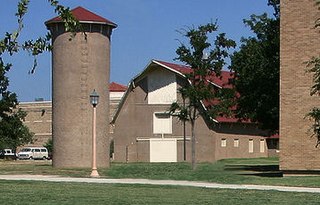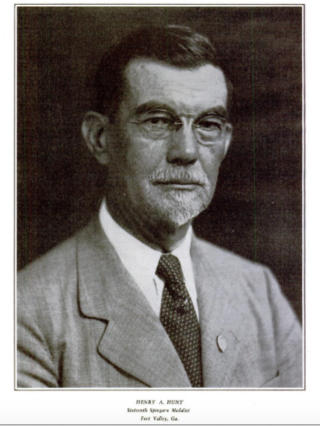Related Research Articles

A farmer is a person engaged in agriculture, raising living organisms for food or raw materials. The term usually applies to people who do some combination of raising field crops, orchards, vineyards, poultry, or other livestock. A farmer might own the farmland or might work as a laborer on land owned by others. In most developed economies, a "farmer" is usually a farm owner (landowner), while employees of the farm are known as farm workers. However, in other older definitions a farmer was a person who promotes or improves the growth of plants, land, or crops or raises animals by labor and attention.

The Grange, officially named The National Grange of the Order of Patrons of Husbandry, is a social organization in the United States that encourages families to band together to promote the economic and political well-being of the community and agriculture. The Grange, founded after the Civil War in 1867, is the oldest American agricultural advocacy group with a national scope. The Grange actively lobbied state legislatures and Congress for political goals, such as the Granger Laws to lower rates charged by railroads, and rural free mail delivery by the Post Office.

4-H is a U.S.-based network of youth organizations whose mission is "engaging youth to reach their fullest potential while advancing the field of youth development". Its name is a reference to the occurrence of the initial letter H four times in the organization's original motto head, heart, hands, and health, which was later incorporated into the fuller pledge officially adopted in 1927. In the United States, the organization is administered by the National Institute of Food and Agriculture of the United States Department of Agriculture (USDA). 4-H Canada is an independent non-profit organization overseeing the operation of branches throughout Canada. There are 4-H organizations in over 50 countries; the organization and administration varies from country to country.

The history of agricultural science is a sub-field of the history of agriculture which looks at the scientific advancement of techniques and understanding of agriculture. Early study of organic production in botanical gardens was continued in with agricultural experiment stations in several countries.

Agricultural education is the systematic and organized teaching, instruction and training available to students, farmers or individuals interested in the science, business and technology of agriculture as well as the management of land, environment and natural resources.
Walter Stephenson Newman was the tenth President of Virginia Tech, serving from 1947 until 1962.

Galena Park High School is a secondary school located in Galena Park, Texas, United States and is one of three secondary schools in the Galena Park Independent School District (GPISD).

The New Farmers of America (NFA) was organized in Tuskegee, Alabama and became a national organization for African-American young men in 1935. The organization was formed to serve agriculture students in southern states where schools were segregated by law. Much like the National FFA Organization (FFA), NFA sought to provide young men with vocational, social and recreational activities in order to develop their skills in public speaking, leadership and agricultural trades. The two organizations merged in 1965.
Wallace H. Jerome was an American businessman, and the founder of Jerome Foods, later the Turkey Store Company, which was sold to Hormel Foods and merged with Jennie-O Foods, to form what is known today as the Jennie-O Turkey Store company and products. He is considered a pioneer of the domestic turkey industry.

The Chicago High School for Agricultural Sciences (CHSAS) is a public 4–year magnet high school located in the Mount Greenwood neighborhood on the far south side of Chicago, Illinois, United States. The school is operated by the Chicago Public Schools district. CHSAS opened for the 1985–86 school year in August 1985. The school is located on a 72-acre (290,000 m2) campus, 40 acres (160,000 m2) of which are dedicated to a working farm, and the students commute from all across the city to CHSAS.
The National Professional Agricultural Student Organization, regularly referred to as PAS, is a national organization associated with postsecondary institutions offering baccalaureate degrees, associate degrees, diplomas and/or certificates in agriculture/agribusiness and natural resources. PAS is one of the ten career and technical student organizations that has been approved by the United States Department of Education as an integral part of career and technical education also referred to as vocational education. PAS is a member of the Consortium of Collegiate Agricultural Organizations.

Henry Alexander Hunt was an American educator who led efforts to reach blacks in rural areas of Georgia. He was awarded the Spingarn Medal by the National Association for the Advancement of Colored People (NAACP), as well as the Harmon Prize. In addition, he was recruited in the 1930s by President Franklin D. Roosevelt to join the president's Black Cabinet, an informal group of more than 40 prominent African Americans appointed to positions in the executive agencies.
The University of Maryland College of Agriculture and Natural Resources is the agricultural and environmental sciences college of the University of Maryland and operates the Maryland Sea Grant College in cooperation with the University of Maryland Center for Environmental Science and the National Oceanic and Atmospheric Administration.

The Bush School of Government and Public Service is an undergraduate and graduate college of Texas A&M University founded in 1997 under former US President George H. W. Bush's philosophy that "public service is a noble calling." Since then, the Bush School has continued to reflect that notion in curriculum, research, and student experience and has become a leading international affairs, political science, and public affairs institution.
The Michigan Farm Radio Network (MFRN) is a radio network that provides specialty programming geared toward farmers in Michigan. It is owned by Learfield Communications and is a sisters with the Michigan Radio Network.

"So God Made a Farmer" was a speech given by radio broadcaster Paul Harvey at the 1978 Future Farmers of America convention. The speech was first published in 1986 in Harvey's syndicated column. The speech borrowed a few phrases from a 1975 article written by Harvey in the Gadsden Times, which was itself inspired by parts of a 1940 definition of a dirt farmer published in The Farmer-Stockman. The 1940 article was copied verbatim by Tex Smith in a letter to the editor in the Ellensburg Daily Record in 1949. The speech was given as an extension of the Genesis creation narrative referring to God's actions on the 8th day of creation. Harvey described the characteristics of a farmer in each phrase, ending them with the recurring "So God Made a Farmer".
Michael McBride is an Australian youth football (soccer) coach who presently holds the position of assistant coach at Australia national under-17 soccer team and technical analyst of the Socceroos. He is part of a new generation of youth coaches in Australia that focus on developing the relationship between technique and intelligence.

The National FFA Organization, often referred to simply as FFA, is an American non-profit career and technical student organization, which offers middle and high school classes that promote and support agricultural education. FFA was founded in 1925 at Virginia Polytechnic Institute, by agriculture teachers Henry C. Groseclose, Walter Newman, Edmund Magill, and Harry Sanders as Future Farmers of Virginia. In 1928, it became a nationwide organization known as Future Farmers of America.
The Kentucky FFA Association is a student-led organization centered around agricultural education and career development. Serving as Kentucky's Chapter of the National FFA Organization, the primary goal is to follow the wider organizations stated mission.
References
- 1 2 3 4 5 6 7 8 9 10 11 12 Prats, J.J. "Henry C. Groseclose". The Historical Marker Database. Retrieved 31 May 2013.
- 1 2 3 Hillson, John. "The Role of Agricultural Education Teacher Educator Yesterday, Today, and Tomorrow" (PDF). pubs.aged.tamu.edu. Retrieved 4 June 2013.
- 1 2 3 4 5 6 Hillson, John. "The Role of Virginia in the Development of the FFA" (PDF). pubs.aged.tamu.edu. Retrieved 31 May 2013.
- 1 2 3 4 5 Hillson, John; Bryant, Brad. "Agricultural Societies as Antecedents of the FFA" (PDF). pubs.aged.tamu.edu. Retrieved 4 June 2013.
- 1 2 Virginia Association of Agricultural Educators and FFA Alumni. "Virginia's Role in the Development of the FFA". Virginia FFA. Archived from the original on 3 February 2013. Retrieved 31 May 2013.
- ↑ Hoover, Tracy; Scholl, Jan. "A Historical Review of Leadership Development in the FFA and 4-H" (PDF). jae-online. Retrieved 4 June 2013.
- ↑ Virginia Association of Agricultural Educators and FFA Alumni. "History of the FFA". Virginia FFA. Archived from the original on 22 August 2012. Retrieved 31 May 2013.